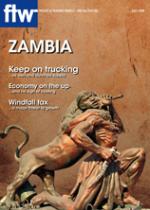WHILE ZAMBIA is currently enjoying an economic
explosion due to the insatiable global demand and
high price of copper, the question that begs to be
answered is why all of the copper is being exported
either as concentrate or as cathodes.
The same goes for other export goods such as
cotton and tobacco. Very little if any processing and
manufacturing of goods seems to take place in the
country. While the DRC is manufacturing consumer
goods under licence to multi-national companies
such as Unilever and Coca-Cola and exporting it
to its neighbours, the price of consumer goods in
Zambia keeps escalating as virtually everything is
imported via road due to the country’s
landlocked status.
In very practical terms, relying solely on the
export of copper will not lead to sustainable
economic development for the country. Questions
are already being asked by many local businessmen
about the government’s spending of the revenue
earned through copper.
It is being said that very little is seemingly being
spent on infrastructure development such as roads,
schools and hospitals.
For a developing country this should be of
major concern as long-term growth can only take
place if there is a healthy investment by both the
private and public sectors in the development of
infrastructure and the means of production such
as plants, factories and the like. This will increase
employment opportunities for all citizens, lower the
price of consumer goods and prevent a large gap
from forming between the haves and the
have-nots.
Zambia currently has a reputation for political
stability which is well earned. But this, along with
the foreign investment it attracts into the country,
could be jeopardised if measures are not taken to
use and process the abundant raw material produced
in the country to the benefit and betterment of all.
Processing and manufacturing needed for sustainable development
31 Jul 2008 - by Staff reporter
0 Comments
Zambia 2008

31 Jul 2008
31 Jul 2008
31 Jul 2008
31 Jul 2008
31 Jul 2008
31 Jul 2008
31 Jul 2008
31 Jul 2008
